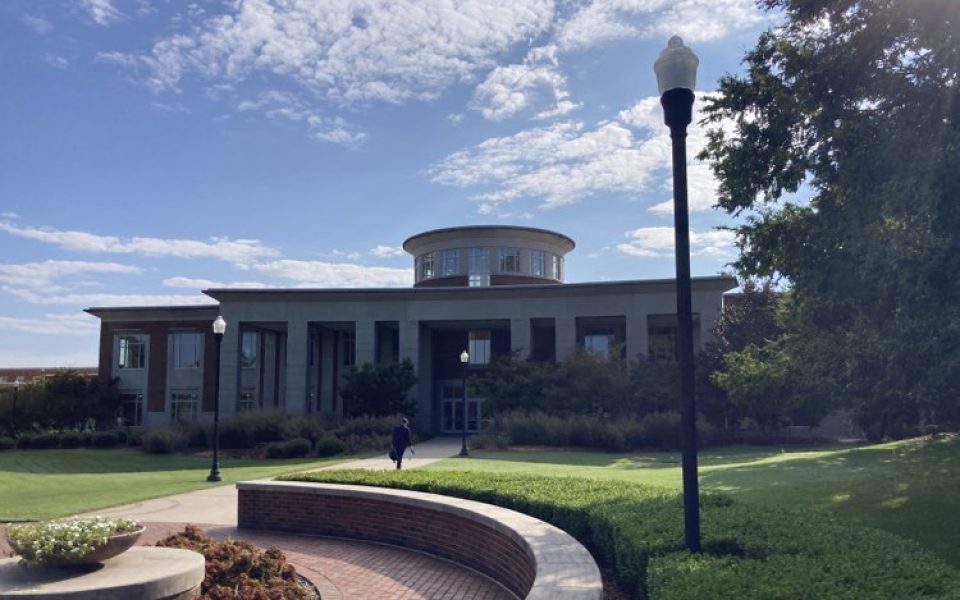UPDATED: This piece was updated to include a response from the university.
On Wednesday afternoon, Charles C. Bolton, the associate dean in the College of Arts and Sciences and the interim head of the Department of Anthropology at UNCG turned in a resignation letter to the college’s dean.
In the letter, which was published by UNCG’s local AAUP chapter and can be read in its entirety here, Bolton notes that he is taking “this action to protest the APR process currently underway at the university.”
The APR process, short for academic program review, has been taking place at UNCG for the last year and has consistently been met by backlash from faculty, staff and students.
On Jan. 16, UNCG administrators released a list of 17 recommended programs to be cut, including the bachelor’s in anthropology, which currently has 68 students enrolled. On Jan. 22, the PhD in computational mathematics was added to the list.
“I have come to understand that some of the decisions made to place programs and courses on the discontinued list — specifically, the BA in Anthropology, the MA in Mathematics, the minors in Russian and Chinese and the courses in Korean — have not been made in a fair, transparent and collaborative way in which the university has repeatedly described the APR process,” Bolton wrote in his letter.
The News & Record reported that Bolton is resigning from his post as associate dean but is expected to continue teaching at the university.
As TCB reported, dozens of faculty members, staff and students gathered at a community forum on Tuesday to ask questions of administrators on how and why certain programs, including the ones mentioned by Bolton, were being cut.
During the meeting, many students spoke passionately about their love of the Korean courses, to which Chancellor Franklin Gilliam made comments that alluded to the fact that he might reconsider cutting those courses. But comments about other programs like anthropology, math and physics were less well-received.
At Tuesday’s meeting, many attendees spoke about the APR process, noting that it was “flawed” and that the university hadn’t followed its own rubric and process for determining which programs to cut.
“I have held administrative positions for 31 of my 34 years in academia (10 as a center director, 15 as a department head at two institutions, and 6+ as an associate dean), and I know egregious behavior from senior administration when I see it,” Bolton wrote.
In his remarks, Bolton likened UNCG’s APR process to a similar situation he witnessed while at the University of Southern Mississippi as a department head. There, Bolton said administration reorganized the university from nine academic units to five.
“While not on quite as grand a scale, I believe that the pending recommendations at UNCG…are equally heavy-handed and capricious, decisions made by one individual (Provost Storrs) in an unfair, nontransparent, and uncollaborative way.”
TCB reported that the same consulting firm UNCG has worked with for this academic review process, has been hired by other universities throughout the country for reorganization and academic cuts.
In interviews with faculty from other universities, professors mentioned how aggressive tactics like the ones being employed at UNCG have ultimately changed the fabric of their institutions and, in some cases, created drastic enrollment drops. Current and former faculty noted how the consulting groups and university administrators began treating the schools like businesses run for profits, rather than educational institutions concerned with the public good.
In his letter, Bolton noted his resignation to become effective May 31 of this year.
“My hope is that such a departure date will minimize any problems for CAS administration,” he wrote. “However, if you need/want me to vacate these positions earlier, I will completely understand that decision.”
Bolton’s resignation is one of the first major, public departures of a faculty or department head brought upon by the university’s APR process.
In an email, Kimberly Osborne, the interim vice chancellor for strategic communications, referenced comments that College of Arts and Sciences Dean John Kiss made at the UNCG Faculty Senate meeting on Jan. 24.
In his remarks, Dean Kiss said, “I looked at all the programs and worked with my three associate deans. We had a robust internal discussion and part of this we worked with Provost Storrs and discussed the programs. We came to a consensus. I think Chuck is giving his interpretation.”
Join the First Amendment Society, a membership that goes directly to funding TCB‘s newsroom.
We believe that reporting can save the world.
The TCB First Amendment Society recognizes the vital role of a free, unfettered press with a bundling of local experiences designed to build community, and unique engagements with our newsroom that will help you understand, and shape, local journalism’s critical role in uplifting the people in our cities.
All revenue goes directly into the newsroom as reporters’ salaries and freelance commissions.


Leave a Reply